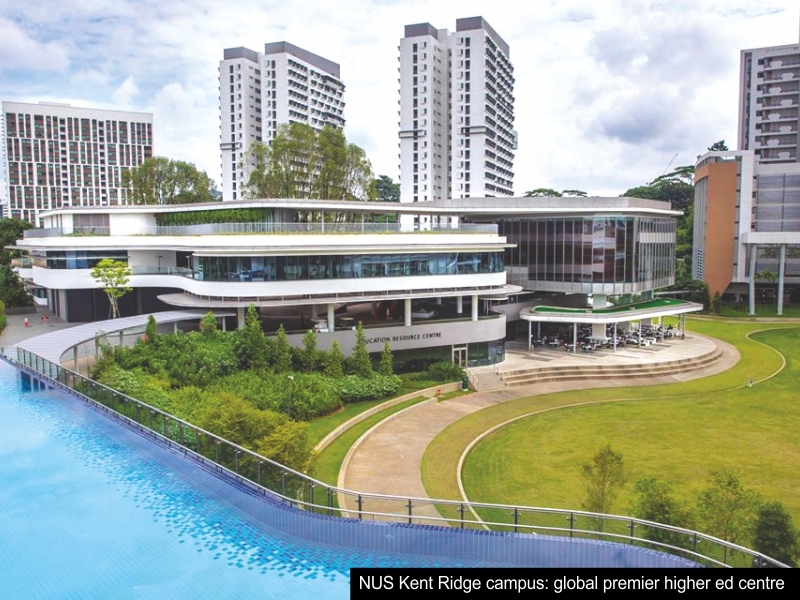Its rigorous academic programmes and high-quality research have earned this prosperous island nation’s oldest university the reputation of Asia’s premier higher education institution – Dipta Joshi
The National University of Singapore (NUS, estb.1905) is the island nation’s oldest and most internationally reputed higher education institution. Its rigorous academic programmes and high-quality research have earned it the reputation of the premier centre of higher education in Asia. In the QS World University Rankings 2021 NUS is ranked #11, while the Times Higher Education ranks it #25 in its WUR 2021.
Spread across three contemporary campuses in Singapore, NUS has also established 11 overseas colleges in China (Shanghai, Shenzhen and Beijing), Israel, Sweden (Stockholm), United States (Silicon Valley and New York), Canada (Toronto), Switzerland (Lausanne) and Germany (Munich). Founded in 1905 as a modest medical school by a group of local businessmen, this 115-year-old institution has changed hands (and names) several times before the National University of Singapore was established following the merger of the University of Singapore and Nanyang University in 1980.
NUS is especially reputed for its high-impact research in engineering, social sciences, natural science, life sciences and biomedicine. It hosts an awesome 29 research institutes and three of Singapore’s five Research Centres of Excellence.
Currently, NUS’ 17 multi-disciplinary colleges offer 300 undergraduate and postgrad programmes to 43,885 students from over 100 countries mentored by 2,314 faculty. Notable alumni include Kofi Annan, former secretary-general of the United Nations; Benjamin Sheares, former president of Singapore, and Margaret Chan, director-general of the World Health Organisation, among others.
To check the spread of the still rampaging Covid-19 pandemic, NUS currently provides a mix of online and offline classes to students.
Singapore. Once a British colony and untidy port, over the past five decades since it became a politically independent island nation, Singapore (pop.5.69 million) has miraculously metamorphosed into Southeast Asia’s most prosperous, modern and well-administered country notable for civic discipline and high per capita income (US $92,270). Also South-east Asia’s business and financial nerve centre, it boasts an excellent public transport system and public parks, museums, restaurants, nightclubs and tourist destinations including the verdant Botanic Gardens — a Unesco World Heritage site.
Singapore’s climate is tropical — warm and wet most of the year. December is the coolest month and May the warmest with average temperatures ranging between 220-33o celsius. English is the language of administration, business and technology. Other languages spoken are Malay, Chinese (Mandarin) and Tamil.
Campus facilities. In Singapore, NUS sprawls across three campuses — Kent Ridge, Bukit Timah and Outram — all set amid green groves. The Bukit Timah campus is sited contiguous to the Botanic Gardens and Outram campus adjacent to Fort Canning Park.
The main Kent Ridge campus is spread across 150 hectares and houses the university’s academic, research and admin buildings, student residence halls, sports and other recreational facilities. This campus is linked by the College Link Bridge to University Town (UTown) which hosts the Yale-NUS College, Singapore’s first fully residential liberal arts college. The Bukit Timah campus, covered with over 60 species of flowering trees and splendid colonial-era heritage buildings, hosts the Lee Kuan Yew School of Public Policy and NUS Faculty of Law, while the Outram campus hosts the Duke-NUS Medical School.
These state-of-the-art ultra-modern NUS campuses provide students a multitude of multimedia facilities including digital scholarship and think labs equipped with augmented and virtual learning tools. The university’s eight modern libraries including the Central, C.J. Koh Law and medical libraries house over 3 million titles and archival material dating back to the 14th century.
Sports and recreational facilities are equally impressive. They include track and field athletics tracks, badminton, squash, basketball and volleyball courts and multi-purpose sports halls. Moreover, there are over 200 student organisations on campus which host a plethora of social and cultural events through the year.
Admission. The minimum eligibility requirement for admission into NUS’ undergraduate programmes is successful completion of class XII/Plus Two with applicants required to submit exam results to the NUS office of admissions within three working days of the declaration of results. In addition, applicants need to submit ACT/SAT as well as TOEFL/IELTS English language test scores. Apart from academic credentials, the admissions office also gives weightage to achievements in co-curricular and sports activities, performance in academic olympiads and professional entrance exams such as IIT-JEE/AIEEE among others. The last date for submitting admission applications is March 31, 2021.
For admission into postgraduate programmes, students are required to submit GRE/GMAT scores and IELTS/TOEFL test scores.
For further information, see https://www.nus.edu.sg/oam/apply-to-nus/international-qualifications/admissions-requirements
Accommodation. NUS offers students a choice of 17 types of accommodation including residence halls, student residences and residential colleges. Students residing on-campus need to subscribe to meal plans — the campus boasts 70 food and retail outlets in addition to the 966-seats Deck Canteen.
Degree programmes. NUS’ 17 colleges offer 150 undergraduate and 150 postgrad programmes including 70 double, 35 joint, and 25 concurrent degrees. The university’s double degree programmes are offered in alliance with globally top-ranked universities including the University of Edinburgh, King’s College, London and Peking University, China among others.
Scholastic Options at NUS
NUS’ 17 colleges include the Faculty of Arts and Social Sciences, NUS Business School, School of Dentistry, NUS Computing, NUS School of Design and Environment, Duke-NUS Medical School, NUS Engineering, NUS Law, Yong Yoo Lin School of Medicine, NUS Graduate School of Integrative Sciences and Engineering Programme, Saw Swee Hock School of Public Health, Lee Kuan Yew School of Public Policy, Faculty of Science, Institute of Systems Science, Risk Management Institute, Temasek Defence System Institute, Logistics Institute-Asia Pacific and Yale-NUS College.
Undergraduate degrees are offered in 11 disciplines including humanities and sciences, business and accountancy, computing, dentistry, engineering, law, medicine, design and environment, nursing, pharmacy and music.
NUS has also collaborated with Yale University to offer a liberal arts programme and with King’s College London and University of Edinburgh for PhD programmes.
For more details visit https://www.nus.edu.sg/admissions
Tuition fees (per year): S$38,000
Living expenses: S$8,800
NB: S$= Rs.55.55




























